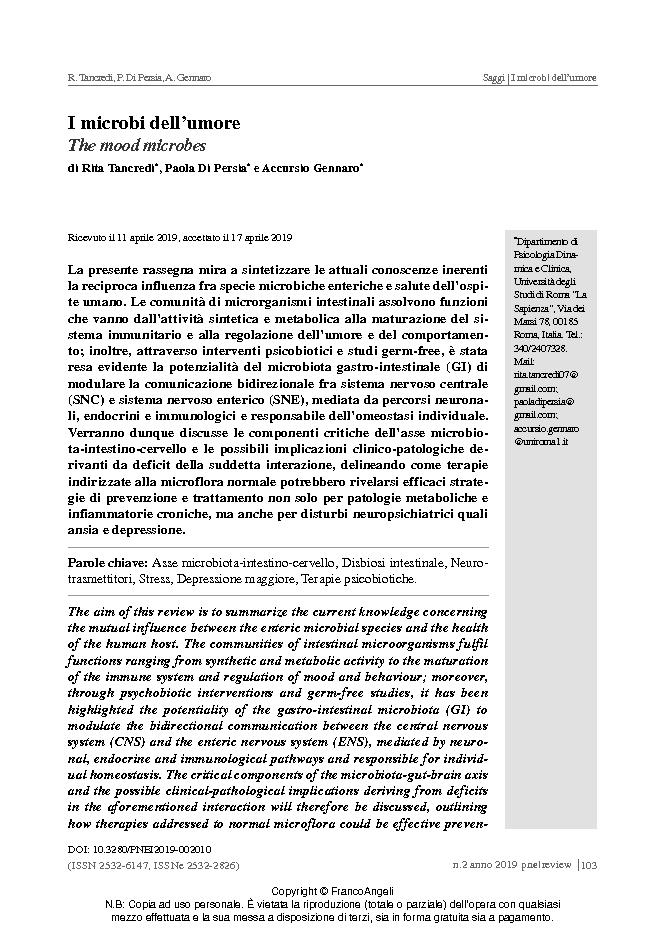I microbi dell'umore
103-112 p.
La presente rassegna mira a sintetizzare le attuali conoscenze inerenti la reciproca influenza fra specie microbiche enteriche e salute dell'ospite umano. Le comunità di microrganismi intestinali assolvono funzioni che vanno dall'attività sintetica e metabolica alla maturazione del sistema immunitario e alla regolazione dell'umore e del comportamento; inoltre, attraverso interventi psicobiotici e studi germ-free, è stata resa evidente la potenzialità del microbiota gastro-intestinale (GI) di modulare la comunicazione bidirezionale fra sistema nervoso centrale (SNC) e sistema nervoso enterico (SNE), mediata da percorsi neuronali, endocrini e immunologici e responsabile dell'omeostasi individuale.
Verranno dunque discusse le componenti critiche dell'asse microbiota- intestino-cervello e le possibili implicazioni clinico-patologiche derivanti da deficit della suddetta interazione, delineando come terapie indirizzate alla microflora normale potrebbero rivelarsi efficaci strategie di prevenzione e trattamento non solo per patologie metaboliche e infiammatorie croniche, ma anche per disturbi neuropsichiatrici quali ansia e depressione. [Testo dell'editore].
The aim of this review is to summarize the current knowledge concerning the mutual influence between the enteric microbial species and the health of the human host. The communities of intestinal microorganisms fulfil functions ranging from synthetic and metabolic activity to the maturation of the immune system and regulation of mood and behaviour; moreover, through psychobiotic interventions and germ-free studies, it has been highlighted the potentiality of the gastro-intestinal microbiota (GI) to modulate the bidirectional communication between the central nervous system (CNS) and the enteric nervous system (ENS), mediated by neuronal, endocrine and immunological pathways and responsible for individual homeostasis.
The critical components of the microbiota-gut-brain axis and the possible clinical-pathological implications deriving from deficits in the aforementioned interaction will therefore be discussed, outlining how therapies addressed to normal microflora could be effective preven tion and treatment strategies not only for metabolic and chronic inflammatory diseases, but also for neuropsychiatric disorders such as anxiety and depression. [Publisher's text].
Ist Teil von
PNEI review : rivista della Società Italiana di Psiconeuroendocrinoimmunologia : 2, 2019-
Artikel aus derselben Ausgabe (einzeln erhältlich)
-
Informationen
ISSN: 2532-2826
KEYWORDS
- Asse microbiota-intestino-cervello, Disbiosi intestinale, Neurotrasmettitori, Stress, Depressione maggiore, Terapie psicobiotiche
- Microbiota-gut-brain axis, Gut dysbiosis, Neurotransmitters, Stress, Major depressive disorder, Psychobiotic therapies



